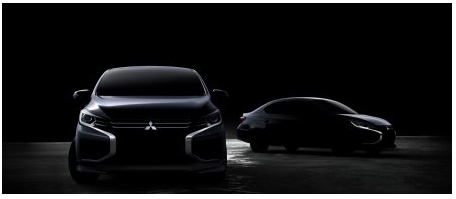Boulogne-Billancourt, 11/12/2019 – Nissan released today its results for the second quarter of fiscal year 2019/2020 (April 1st, 2019 to March 31th, 2020). Nissan’s results, published in Japanese accounting standards, for the second quarter of fiscal year 2019/2020 (July 1st to September 30th, 2019), after IFRS restatements, will have a positive contribution to Renault’s third… Continue reading Renault: Nissan contributes € 233 million for third quarter 2019 to Renault’s earnings
Tag: Mitsubishi
GROUPE RENAULT : Nissan contributes € 233 million for third quarter 2019 to Renault’s earnings
PRESS RELEASE Nissan contributes € 233 million for third quarter 2019 to Renault’s earningsBoulogne-Billancourt, 11/12/2019 – Nissan released today its results for the second quarter of fiscal year 2019/2020 (April 1st, 2019 to March 31th, 2020).Nissan’s results, published in Japanese accounting standards, for the second quarter of fiscal year 2019/2020 (July 1st to September 30th, 2019),… Continue reading GROUPE RENAULT : Nissan contributes € 233 million for third quarter 2019 to Renault’s earnings
Mitsubishi reveals new Xpander Cross for ASEAN markets
Mitsubishi has taken the wraps off the Xpander Cross, which is essentially a rugged alternative to the standard Xpander MPV. The model will first go on sale in Indonesia and then will be introduced in other ASEAN markets. The Xpander Cross gets the same body panels as the Xpander MPV but with a number of… Continue reading Mitsubishi reveals new Xpander Cross for ASEAN markets
GM Sells Lordstown Plant To Lordstown Motors: Affiliated With Workhorse
Lordstown Motors purchased GM’s Lordstown Complex to produce electric pickup trucks, using Workhorse W-15 tech as a base. General Motors has sold its shuttered Lordstown Complex in Lordstown, Ohio to a start-up Lordstown Motors Corp., affiliated with Workhorse Group. The parties began talks about the deal since Spring 2019. The purchase price was not disclosed… Continue reading GM Sells Lordstown Plant To Lordstown Motors: Affiliated With Workhorse
Honda cuts operating profit forecast on stronger yen
FILE PHOTO: The logo of Honda is seen on a Monster model during a Motor Day Exibition in Rome, Italy, March 5 2016. REUTERS/Alessandro Bianchi TOKYO (Reuters) – Honda Motor Co (7267.T) on Friday cut its full-year profit outlook by about 10% on expectations of a stronger yen. Japan’s No.3 automaker cut its forecast for… Continue reading Honda cuts operating profit forecast on stronger yen
MITSUBISHI MOTORS Restyles Mirage and Attrage Compact Models
TOKYO, Nov 7, 2019 – (JCN Newswire) – MITSUBISHI MOTORS CORPORATION (MMC) is to launch facelifted and updated Mirage(1) hatchback and Attrage(2) sedan models, both global compact cars, in Thailand on November 18, 2019. Both models will feature sharp and dynamic exterior designs that embody the Mitsubishi-ness that identifies the company’s compact cars. Mirage and… Continue reading MITSUBISHI MOTORS Restyles Mirage and Attrage Compact Models
New Toyota Yaris GR-4 hot hatchback teased
Toyota has issued the first glimpse of its forthcoming Yaris hot hatchback – a homologation special that will be the successor to the current GRMN. Shown in a teaser – which states there will be a reveal of some type at Rally Australia on 17th November – the car appears to be named Yaris GR-4.… Continue reading New Toyota Yaris GR-4 hot hatchback teased
Cars.com Reports Third Quarter 2019 Results
CHICAGO, Nov. 6, 2019 /PRNewswire/ — Cars.com Inc. (NYSE: CARS) (“Cars.com” or the “Company”), a leading digital marketplace and solutions provider for the automotive industry, today released its financial results for the quarter ended September 30, 2019. Q3 Financial Highlights Revenue of $152.1 million, down $17.2 million, or 10%, year-over-year, in line with expectations Non-cash… Continue reading Cars.com Reports Third Quarter 2019 Results
Mitsubishi Motors slashes full-year profit forecast on slowing car sales
FILE PHOTO: The logo of Mitsubishi Motors Corp is seen at a showroom of the company’s headquarters in Tokyo, Japan November 26, 2018. REUTERS/Toru Hanai TOKYO (Reuters) – Mitsubishi Motors Corp (7211.T) on Wednesday cut its full-year profit outlook by 67% as it expects sluggish demand in North America and China will continue, while a… Continue reading Mitsubishi Motors slashes full-year profit forecast on slowing car sales
Analysis: The numbers behind the FCA-PSA merger
The FCA-PSA tie-up gathers 15 brands under the same roof The agreed merger between Fiat Chrysler Automobiles and the PSA Group will create the world’s fourth-largest car company based on sales. The two European firms last week announced their intention to create a new entity owned 50/50 between the two but led by PSA’s CEO, Carlos Tavares. PSA will… Continue reading Analysis: The numbers behind the FCA-PSA merger
